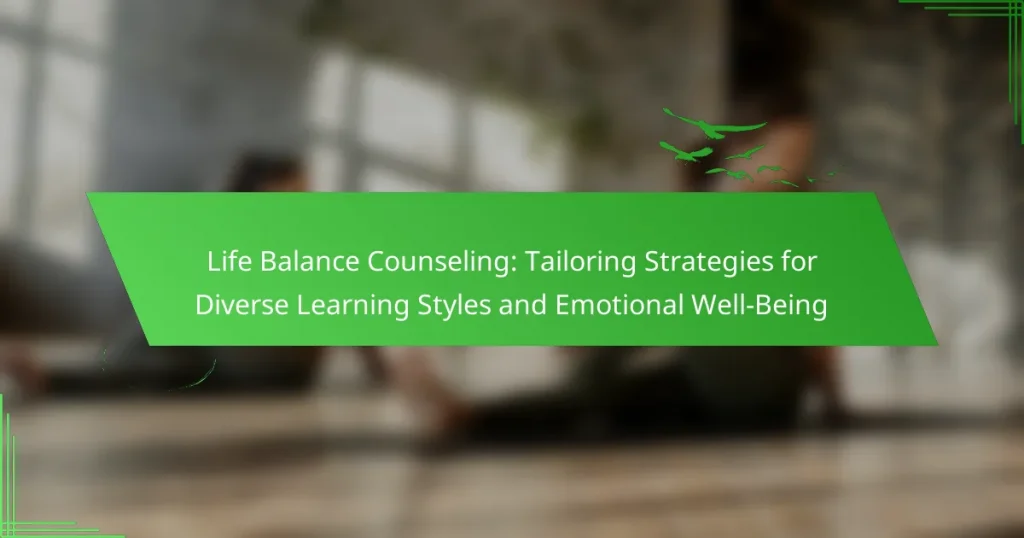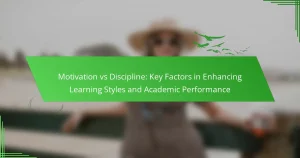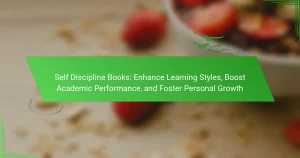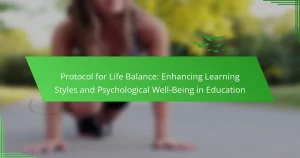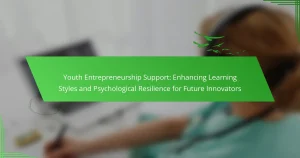Achieving emotional well-being can be challenging, especially when learning styles differ. Life Balance Counseling tailors strategies to accommodate visual, auditory, and kinesthetic learners. This approach enhances engagement through customized materials and fosters a supportive environment. Regular feedback ensures that counseling methods remain relevant and effective for each individual’s unique needs.
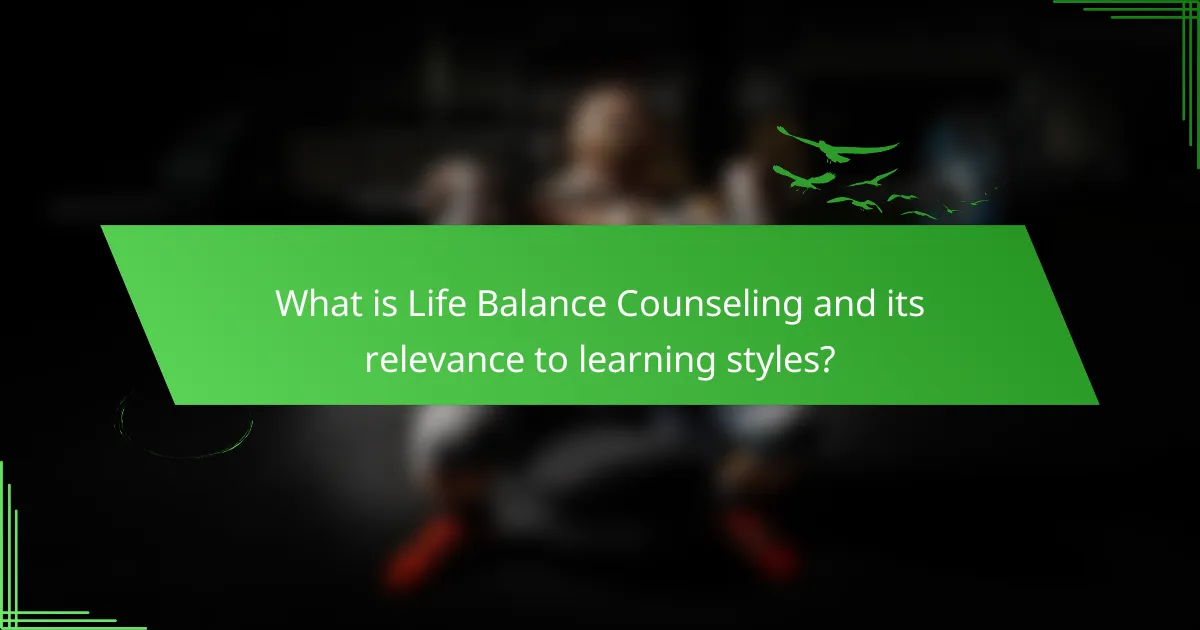
What is Life Balance Counseling and its relevance to learning styles?
Life Balance Counseling helps individuals align their emotional well-being with their unique learning styles. This approach recognizes that diverse learning preferences influence how people process information and cope with challenges.
The counseling process tailors strategies to accommodate visual, auditory, and kinesthetic learners, enhancing engagement and retention. For example, visual learners may benefit from diagrams, while auditory learners might thrive with discussions.
Integrating life balance techniques fosters emotional resilience, promoting healthier responses to stress. This relevance is crucial, as individuals who understand their learning styles can better navigate personal and academic challenges.
Ultimately, Life Balance Counseling serves as a personalized framework, supporting diverse learners in achieving their goals while maintaining emotional stability.
How does educational psychology inform life balance counseling?
Educational psychology significantly enhances life balance counseling by providing insights into diverse learning styles and emotional well-being. It helps counselors tailor strategies that accommodate individual differences, promoting effective communication and engagement. Understanding cognitive and emotional processes allows for the development of personalized interventions that address unique challenges. This approach fosters resilience and adaptability, essential for achieving a balanced life.
What are the key principles of emotional well-being in counseling?
Key principles of emotional well-being in counseling include self-awareness, resilience, and the ability to manage emotions. These principles foster a balanced life by promoting personal growth and effective coping strategies. Self-awareness enables individuals to recognize their emotions and triggers, while resilience helps them navigate challenges. Managing emotions effectively contributes to healthier relationships and improved mental health outcomes. Integrating these principles into counseling practices can enhance clients’ emotional well-being and overall life satisfaction.

What are the universal strategies for tailoring counseling to diverse learning styles?
Tailoring counseling to diverse learning styles involves employing strategies that cater to individual preferences. Understanding these styles enhances emotional well-being and engagement.
1. Assess learning styles: Identify whether clients are visual, auditory, or kinesthetic learners.
2. Customize materials: Use visuals for visual learners, discussions for auditory learners, and hands-on activities for kinesthetic learners.
3. Foster a supportive environment: Create a safe space that encourages open communication and exploration of different learning approaches.
4. Incorporate feedback: Regularly seek client feedback to adjust strategies and ensure effectiveness in meeting their unique needs.
Which learning styles are most commonly recognized in educational psychology?
The most commonly recognized learning styles in educational psychology include visual, auditory, and kinesthetic. Each style reflects unique preferences for processing information. Visual learners benefit from diagrams and charts, auditory learners excel with lectures and discussions, and kinesthetic learners thrive through hands-on activities. Understanding these styles enhances life balance counseling by tailoring strategies to individual needs, promoting emotional well-being.
How can counselors identify individual learning preferences?
Counselors can identify individual learning preferences through assessments, observations, and discussions. Using tools like learning style inventories helps tailor strategies to diverse needs.
1. Conduct assessments to gauge preferences.
2. Observe client interactions and responses.
3. Facilitate discussions to uncover preferred learning methods.
4. Adapt counseling techniques to align with identified styles.
What assessment tools are effective for determining learning styles?
Effective assessment tools for determining learning styles include the VARK questionnaire, Gardner’s Multiple Intelligences assessment, and the Kolb Learning Style Inventory. These tools help identify individual preferences in learning, enabling tailored strategies in Life Balance Counseling. Utilizing these assessments enhances emotional well-being by aligning teaching methods with unique learning attributes.
How do cultural factors influence learning styles?
Cultural factors significantly shape learning styles by influencing values, communication methods, and emotional responses. For instance, collectivist cultures often emphasize group learning, while individualistic cultures may prioritize self-directed study. These differences impact how learners engage with material and interact with peers. Understanding these cultural influences allows life balance counseling to tailor strategies that enhance emotional well-being and accommodate diverse learning preferences.
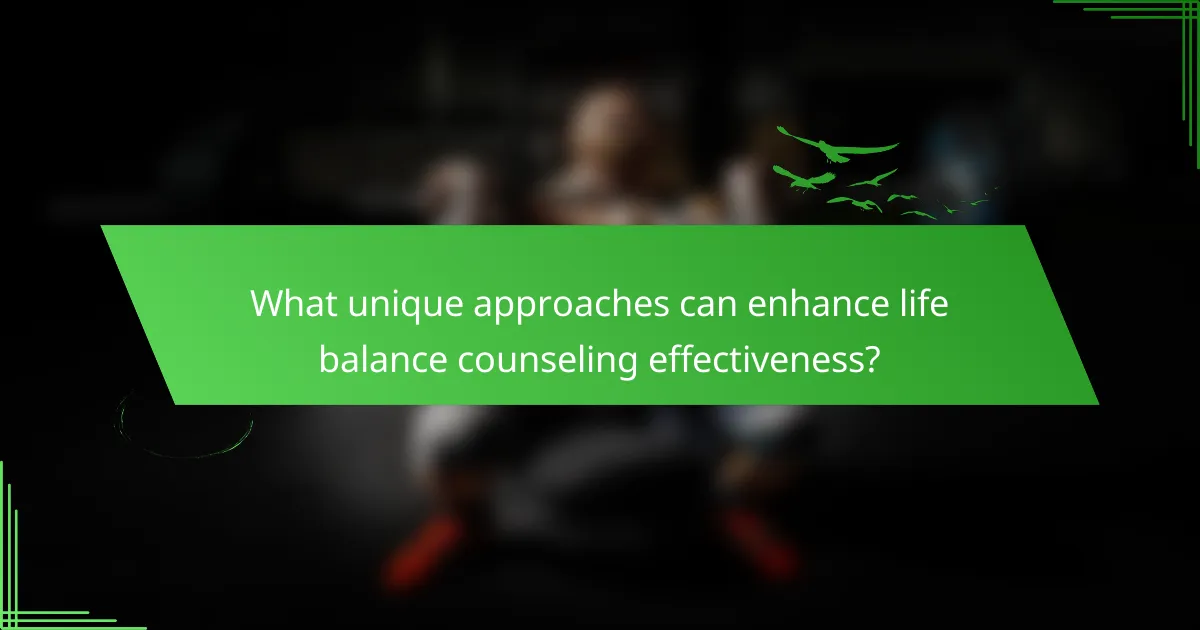
What unique approaches can enhance life balance counseling effectiveness?
Tailoring life balance counseling to individual learning styles enhances its effectiveness significantly. Personalized approaches address unique emotional needs, fostering engagement and progress.
Incorporating visual aids, such as charts and diagrams, can benefit visual learners, while interactive discussions may resonate with auditory learners. Kinesthetic learners thrive through hands-on activities, allowing them to practice balance techniques in real-life scenarios.
Utilizing assessments to identify clients’ preferred learning styles ensures strategies are relevant. This customization increases retention and application of counseling insights, leading to improved emotional well-being.
Regular feedback loops enable counselors to adjust methods based on client responses, ensuring ongoing effectiveness. This adaptive approach not only builds trust but also empowers clients to take an active role in their journey toward balance.
How can personalized learning strategies improve emotional outcomes?
Personalized learning strategies can significantly enhance emotional outcomes by catering to individual needs. Tailoring approaches to diverse learning styles fosters engagement and reduces anxiety. For instance, visual learners may benefit from graphic organizers, while auditory learners thrive on discussions. This alignment increases self-efficacy and promotes emotional resilience. Ultimately, personalized strategies create a supportive environment that nurtures emotional well-being, leading to improved academic performance and personal growth.
What role does technology play in supporting diverse learning styles?
Technology plays a crucial role in supporting diverse learning styles by providing tailored resources and interactive tools. It enhances engagement and personalization, catering to visual, auditory, and kinesthetic learners. For instance, adaptive learning platforms adjust content based on individual progress, fostering emotional well-being. Additionally, multimedia resources like videos and podcasts cater to various preferences, ensuring that all learners can access information effectively. This technological integration promotes inclusivity and supports emotional balance in educational environments.

What rare attributes should counselors consider for specific populations?
Counselors should consider unique attributes such as cultural context, communication preferences, and specific emotional triggers for diverse populations. Tailoring strategies to these aspects enhances engagement and effectiveness in life balance counseling. For example, understanding a client’s cultural background can inform approaches that respect their values and beliefs. Additionally, recognizing various learning styles allows counselors to adapt techniques that resonate with individual clients, promoting emotional well-being.
How do neurodiverse clients benefit from tailored counseling approaches?
Tailored counseling approaches significantly benefit neurodiverse clients by addressing their unique learning styles and emotional needs. These strategies enhance engagement and promote effective communication.
Counselors can utilize personalized methods, such as visual aids or structured routines, to cater to diverse processing styles. This customization fosters a safe environment where clients feel understood and validated.
Research indicates that tailored interventions improve therapeutic outcomes, leading to increased client satisfaction and retention. For instance, neurodiverse individuals often respond better to specific techniques that align with their cognitive preferences.
In summary, tailored counseling approaches empower neurodiverse clients by enhancing their emotional well-being and promoting life balance through individualized support.
What unique challenges do adult learners face in life balance counseling?
Adult learners in life balance counseling face unique challenges such as time constraints, varied learning styles, and emotional stressors. These factors can hinder their ability to engage fully in counseling sessions. Many adult learners juggle multiple responsibilities, making it difficult to prioritize self-care and counseling. Additionally, they may have diverse educational backgrounds, which affects their preferred learning methods. Emotional barriers, such as anxiety or past experiences, can also complicate their journey toward achieving balance. Tailoring counseling strategies to address these challenges is essential for promoting emotional well-being and effective learning.

What actionable tips can enhance the effectiveness of life balance counseling?
To enhance the effectiveness of life balance counseling, focus on personalized strategies that cater to individual learning styles and emotional needs. Incorporate active listening to understand clients better. Utilize diverse techniques, such as mindfulness exercises and goal-setting frameworks, to engage different learning preferences. Encourage regular feedback to adjust approaches, ensuring they remain relevant and effective. Establish a supportive environment that fosters trust and openness, allowing clients to express their challenges freely.
What common mistakes should counselors avoid when addressing learning styles?
Counselors should avoid overgeneralizing learning styles, neglecting individual differences, and failing to adapt strategies. Misunderstanding the impact of emotional well-being can also hinder effectiveness. Each client requires personalized approaches to address their unique learning preferences and emotional needs.
How can counselors continuously improve their strategies for emotional well-being?
Counselors can continuously improve their strategies for emotional well-being by integrating feedback, utilizing diverse learning styles, and staying updated with research. Regularly assessing client progress allows for tailored interventions that meet individual needs. Engaging in professional development ensures counselors adopt innovative techniques. Collaborating with peers fosters the exchange of effective practices, enhancing overall counseling effectiveness.
